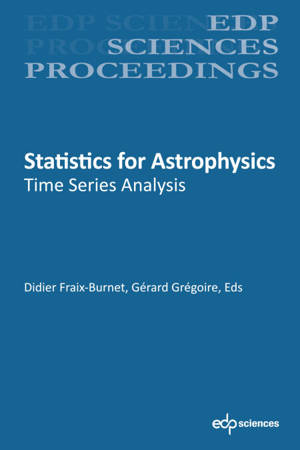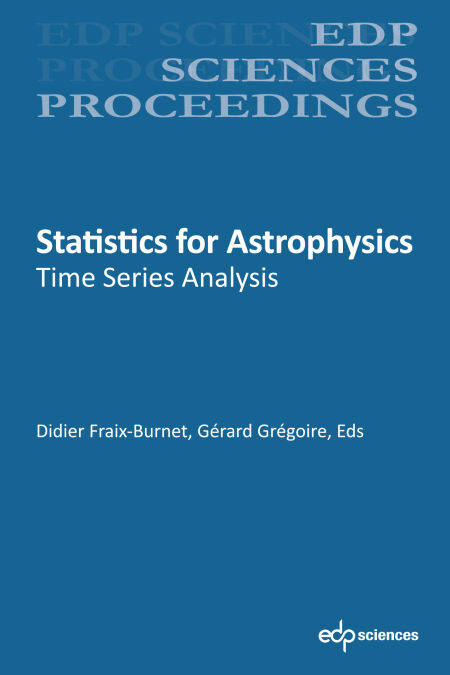
- Retrait gratuit dans votre magasin Club
- 7.000.000 titres dans notre catalogue
- Payer en toute sécurité
- Toujours un magasin près de chez vous
- Retrait gratuit dans votre magasin Club
- 7.000.0000 titres dans notre catalogue
- Payer en toute sécurité
- Toujours un magasin près de chez vous
Statistics for astrophysics EBOOK
Time series analysis
Didier Fraix-Burnet, Gérard Grégoire
Ebook | Anglais
38,99 €
+ 38 points
Description
This book is the result of the 2019 session of the School of Statistics for Astrophysics (Stat4Astro) that took place on October, 6 to 11, 2019, at Autrans near Grenoble, in France. The topic of this fourth session was the time series that, from celestial mechanics to gravitational waves, from exoplanets to quasars, concern nearly all the astrophysics. Variable phenomena are ubiquitous in the Universe: periodic (orbits, cycles, pulses, rotations...), transient (explosions, bursts, stellar activity...), random (accretion, ejection...) or regular (apparent motions...). The detection, the characterization and the classification of these variabilities is a discipline of statistics called time series analysis.
Time series analysis is not new in astrophysics, but has been the subject of major developments in many other disciplines (meteorology, finance, economy, medical sciences...). In this book, you will find lectures from two statisticians who are experts in this field. Gérard Grégoire, who has a long experience in econometrics and made a huge contribution to both this book and the session. He covers the basic elements of classical L2 time series, in the time domain as well as in the frequency domain, for univariate and multivariate series, and provides also tools for statistical inference. He gives an extensive presentation of ARMA and ARIMA series, and addresses some related advanced topics. He also devotes a chapter to linear Gaussian state space models and Kalman filtering that will be helpful to follow the last chapter written by Éric Moulines and collaborators: this final chapter is dedicated to state space models in a general framework and sequential Monte Carlo methods to leverage recursions generalizing the Kalman recursions for filtering and smoothing. Many practical exercises are given using the R environment.
Time series analysis is not new in astrophysics, but has been the subject of major developments in many other disciplines (meteorology, finance, economy, medical sciences...). In this book, you will find lectures from two statisticians who are experts in this field. Gérard Grégoire, who has a long experience in econometrics and made a huge contribution to both this book and the session. He covers the basic elements of classical L2 time series, in the time domain as well as in the frequency domain, for univariate and multivariate series, and provides also tools for statistical inference. He gives an extensive presentation of ARMA and ARIMA series, and addresses some related advanced topics. He also devotes a chapter to linear Gaussian state space models and Kalman filtering that will be helpful to follow the last chapter written by Éric Moulines and collaborators: this final chapter is dedicated to state space models in a general framework and sequential Monte Carlo methods to leverage recursions generalizing the Kalman recursions for filtering and smoothing. Many practical exercises are given using the R environment.
Spécifications
Parties prenantes
- Auteur(s) :
- Editeur:
Contenu
- Nombre de pages :
- 258
- Langue:
- Anglais
Caractéristiques
- EAN:
- 9782759827411
- Date de parution :
- 14-02-22
- Format:
- Ebook
- Protection digitale:
- Digital watermarking
- Format numérique:

Les avis
Nous publions uniquement les avis qui respectent les conditions requises. Consultez nos conditions pour les avis.






